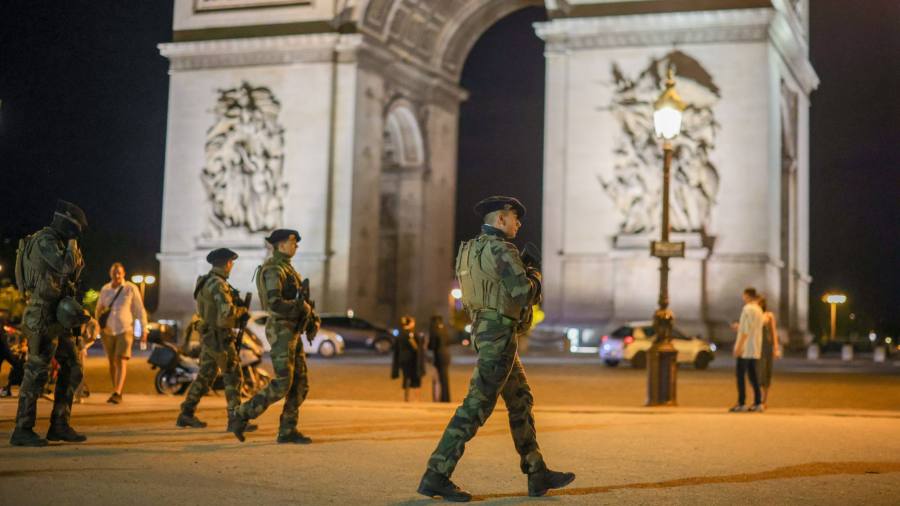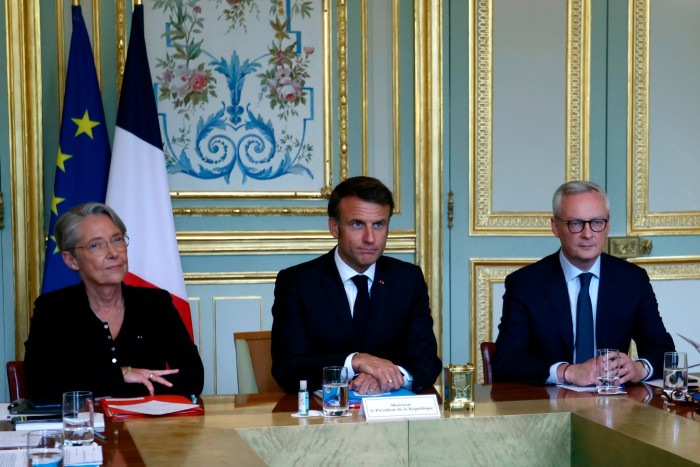
Receive free France updates
We’ll send you a myFT Daily Digest email rounding up the latest France news every morning.
The number of arrests in France dropped for a second consecutive night on Sunday in a sign that the violence that erupted on the streets in response to the death of 17-year-old Nahel may be abating.
During a sixth night of unrest after the fatal police shooting of the teenager last week, France’s interior ministry said on Monday that 157 people had been arrested, compared with 773 on Saturday night and 1,311 on Friday night, with a total of 3,354 people arrested since June 27.
A 24-year-old firefighter died overnight while fighting a blaze in the northern Paris suburb of Saint-Denis. The incident has not yet been linked to the unrest.
The firefighter died attending a blaze at a garage on Sunday night. “We have not established any link with the riots. An investigation is ongoing in order to determine the circumstances,” the Paris Fire Brigade said on Monday.
As the scale of arrests and violent incidents eased, President Emmanuel Macron met ministers on Sunday to chart a political way out of the crisis.
He will meet the leaders of the senate and the national assembly on Monday and more than 220 mayors from across France on Tuesday, a person present at the government’s crisis meeting on Sunday said.
As thoughts turn to the judicial response to the unrest, interior minister Gérald Darmanin said that a third of those arrested were minors and he called for parental responsibility to stop the violence.
“The average age of those we have arrested is 17, with sometimes children of 12 or 13 who are pyromaniacs and have attacked the authorities and elected representatives,” Darmanin told BFMTV on Monday. “We all have to ask ourselves about the responsibility of family and parents because it’s not for the police, mayors or the state to resolve the problem when a 12-year old child lights a school on fire.”
Speaking with broadcaster France Inter on Monday morning, justice minister Éric Dupond-Moretti called for a strong response to those responsible for rioting in recent days.
“A 17-year-old boy cannot take a bullet in the chest and die, so naturally that leads to a lot of emotion, and with this emotion, anger. But ransacking a shop has nothing to do with this emotion,” Dupond-Moretti said, adding that some were using the killing as a “pretext” for violent behaviour.

Three police officers were injured on Sunday night, compared with almost 50 the previous night. Police have maintained a heavy presence across the country, with 45,000 officers active overnight for the past three nights.
A total of 3,354 people have now been arrested since a police officer shot Nahel, a teenager of north African descent from the Parisian suburb of Nanterre during a traffic stop last Tuesday. Protests, riots and vandalism have rocked France since the incident, which was captured on a video that quickly went viral.
An attack on the house of a mayor in L’Haÿ-les-Roses on Saturday night was condemned by politicians across France. Municipal buildings, town halls, schools and other public facilities have been targeted by rioters as supposed symbols of the state.
“We are all very affected,” L’Haÿ-les-Roses mayor Vincent Jeanbrun said of his family on BFMTV. “Young people need to be told: ‘There is a republican order, laws and authority.’ . . . These are not dirty words. Because these things exist, we can then have liberty and equality.”